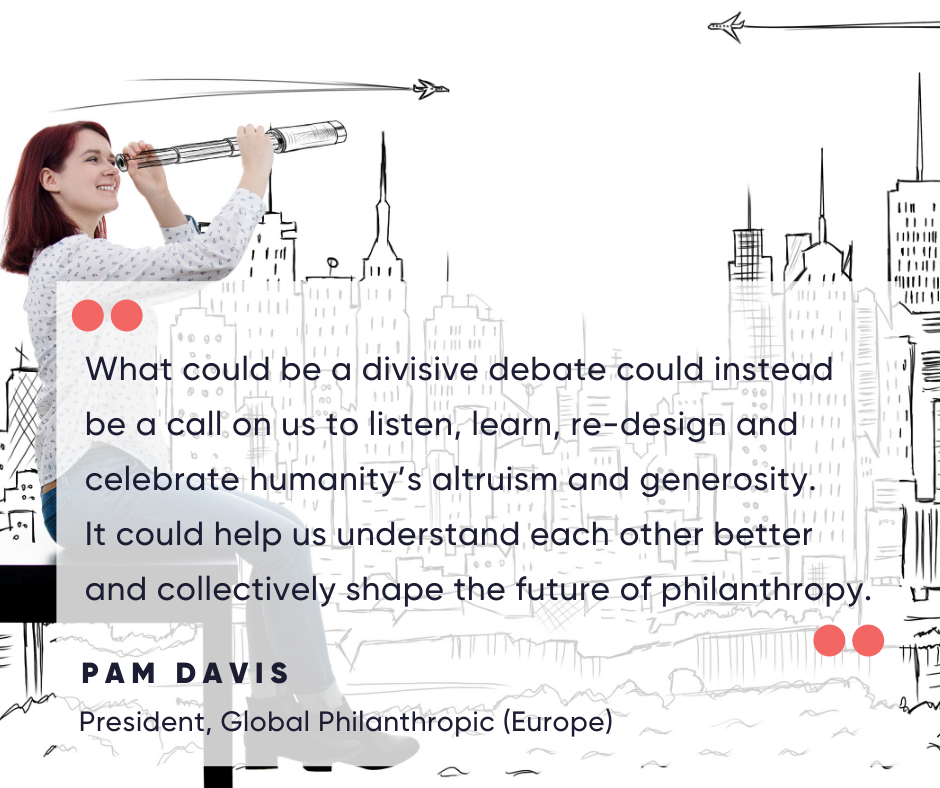
I was recently asked by a large foundation to give my view of the future of philanthropy as part of a study. This prompted me to ask my colleagues at Global Philanthropic to join in a collaborative debate on the subject. Ultimately, we have re-committed ourselves to bringing positive change and equity, through philanthropy, to all of the causes we and our clients support. Here is our thinking.
The recent debate about philanthropy has been framed between those who believe it is largely good, its proponents extolling the virtues that philanthropy matters – it supports organisations doing vital work and improves lives and society — with those who point out its failings. The latter quite rightly raise the concern that it is often tainted with a colonial history and has allowed the very rich to decide what causes ought to shape society and has left many people out of decision-making and self-determination. This contradiction is real – the point is not that one view is right and the other is wrong, but rather that we must listen to and acknowledge all views and work together to shape philanthropy’s future – and its role in our shared future.
What could be a divisive debate could instead be a call on us to listen, learn, re-design and celebrate humanity’s altruism and generosity. It could help us understand each other better and collectively shape the future of philanthropy. It will take all our different voices, philosophies, cultures, genders, colours, physical and mental abilities and whether we are donors, organisations, beneficiaries (and sometimes all three) we must sit at the table together and listen. We have the potential to create our new road map. We desperately need one because the problems we are facing (not least environmentally) threaten our very existence, if we don’t all work together to solve them, we will all lose.
Over the past extraordinary two years, we have observed a few over-arching trends:
- The environment is moving up the agenda and these shared threats have brought out the cross-cutting nature of the challenges and how they affect different people in different ways. If we listen to those voices, we can get closer to the solutions.
- Arts and culture sustain us and define us and are one area where we seem to consistently come together. We need them more than ever.
- Collaboration and partnership promote listening and successful outcomes for organisations, donors and governments – think environmental impact, social impact, gender equity.
- Un-restricted funding is critical to success. It’s not about telling people and organisations how to spend the money but trusting them to spend it where it will do the most good, and by listening to local communities, recipients and those with specialist knowledge.
- Technology can reach and empower those whose voices can’t be heard without amplification. Nonetheless, the most powerful relationships are personal and cannot be stewarded at a distance forever. We cannot live by Zoom alone (pun intended). Technology is definitely part of the future.
Some areas are becoming more critical:
- The tension between the power of the individual and the collective has been highlighted by the pandemic and by the crisis In Ukraine.
- Smaller gifts, donors of colour, and non-traditional philanthropists, are demonstrating the power of collaboration and cooperation. They too have powerful, valuable voices.
- Person-to-person relationships in philanthropy can’t be replaced by technology.
At the heart of philanthropy is Maya Angelou’s wonderful insightful heartfelt belief…
‘I seem to have more than I need and you seem to have less than you need. I would like to share my excess with you.’
We also want to change the conditions that lead to this inequity. We can achieve this by adopting a few ‘superpowers’:
- We must all cultivate generosity at the collective table at which we all take nourishment; generosity of spirit is as important as equity, truth, love, and friendship.
- Approaching collaboration from 360 degrees to get a fuller perspective on a challenge.
- As in all relationships, listen more, tell less.
For more on these topics see Talking Philanthropy 2021, a virtual forum in Singapore, that brought together academics, philanthropists and hundreds of organisations discussing education, health, and environment. Ban Ki-Moon’s key-note speech calls upon us to shape the collective blueprint for the future using SDG 17 ‘partnerships for the goals’ …that clearly highlights the prominent role that the philanthropic community alongside the UN, government, private sector, civil society and others should play to help achieve the SDGs.


